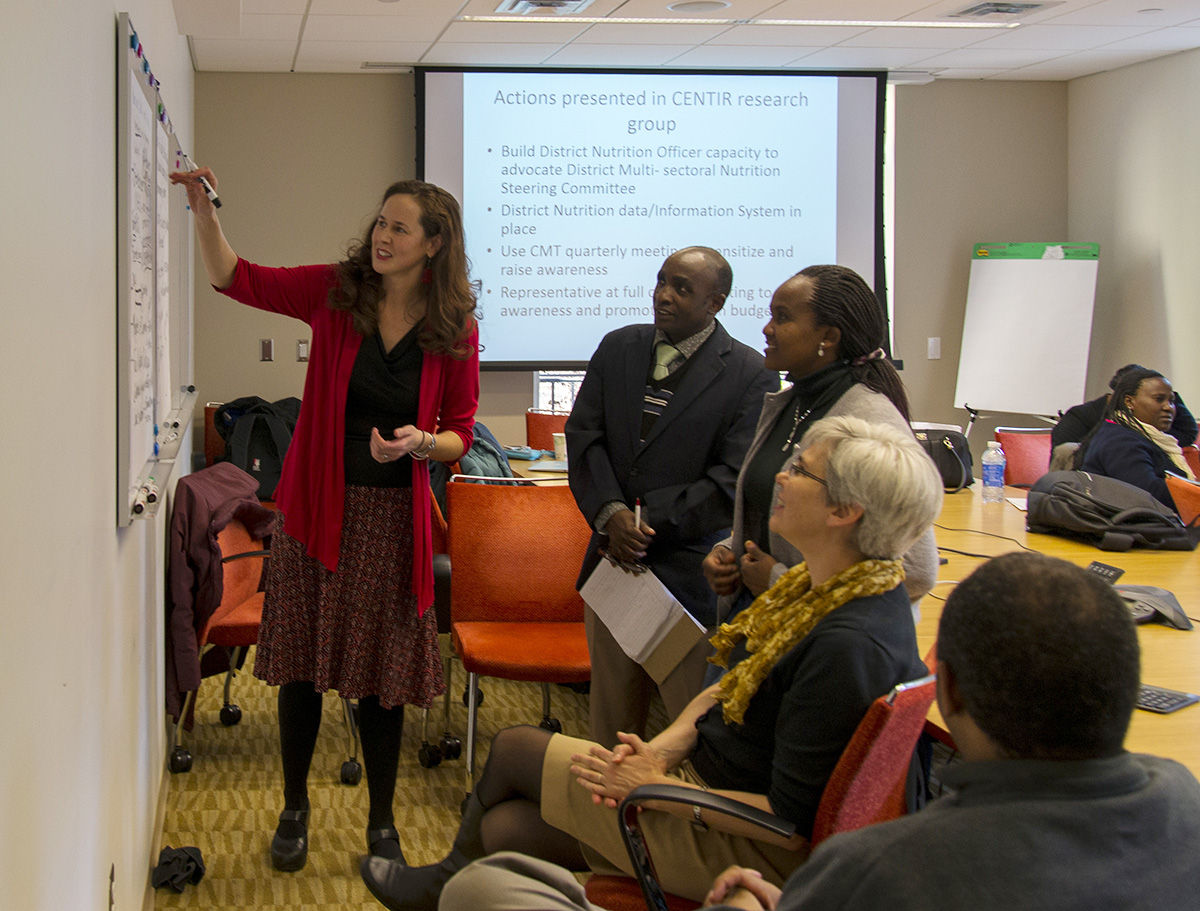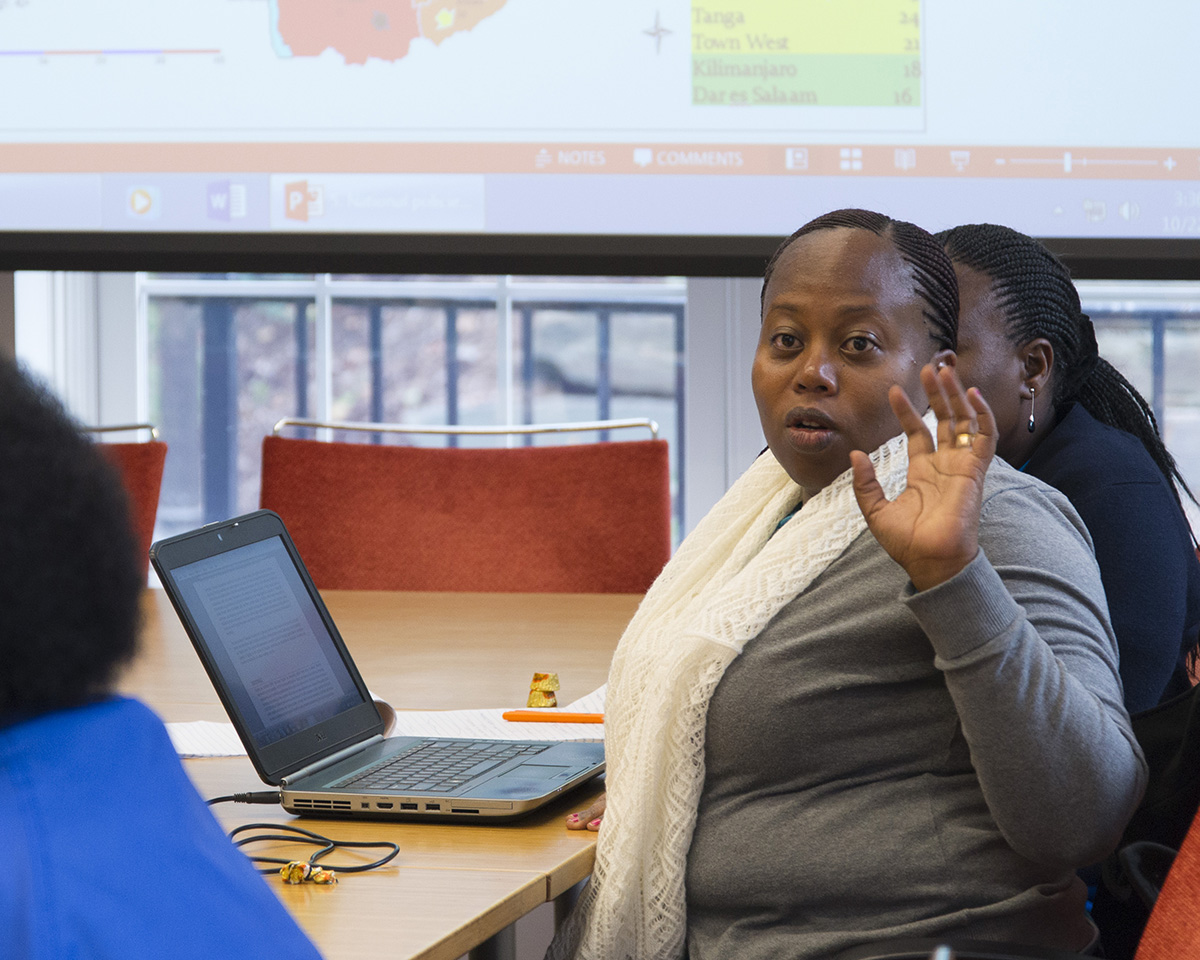Nutritionists from Tanzania turn knowledge into action
By Joe Wilensky

Ten nutrition experts from five Tanzanian institutions spent two weeks on campus Oct. 19-30 with Division of Nutritional Sciences faculty members and researchers as part of the second phase of a project to improve live-saving nutrition interventions and education at the local level in Tanzania.
The collaborative project, “Building Strong Nutrition Systems: Implementation Science in Support of Scaling up Nutrition,” is funded by a grant from the Bill & Melinda Gates Foundation. Cornell nutritional sciences professor Rebecca Stoltzfus, director of the Global Health Program in the College of Human Ecology, is co-principal investigator on the project along with Mary Mosha, a lecturer in the Department of Community Health at Kilimanjaro Christian Medical University College.
The first phase of the partnership, held last year, assessed the nutrition knowledge held by community- and district-level medical and educational staff and others in several Tanzanian communities.
The project’s aims are emphasized by sobering statistics: Globally, more than a third of children suffer from malnutrition; eliminating childhood malnutrition would reduce child deaths by about 35 percent and could help break the intergenerational cycle of poverty.
The program’s strategy depends on the “scaling-up nutrition” (SUN) model: training a sustainable, in-country workforce at the community level in nutrition education and effective interventions. Currently, project leaders say, weaknesses in the capacity to deliver high-quality nutrition interventions at scale in Tanzania affect the health and well-being of 7.3 million children and 10.9 million women of reproductive age and, consequently, the social and economic development of the nation.
The second phase looked at developing an innovative nutrition curriculum and the best ways to implement it for Tanzanian nutrition workers and others early next year.
Akwilina Mwanri, a lecturer in human nutrition at Sokoine University of Agriculture in Tanzania, said interviews with groups and community members in Tanzania during the first phase did indeed find gaps – people reported not having regular contact or access to consultants who are supposed to assist in nutrition education, as well as a lack of awareness of nutritionists in general.
“What they are aware of is the health officer and the clinical officers at the dispensary,” Mwanri said. “So whenever you talk about nutrition, they will tell you about the medical officers and the nurses at the dispensary. But nutrition as nutrition is not known at the community [level].”
Said Stoltzfus, “At the national policy level, Tanzania is a very good example of having a very forward-looking, national nutrition strategy where nutrition is seen as being very much a part of the development agenda, food security, healthy diets, infant feeding and good nutrition for mothers … but when we went down to the grassroots level, we found this big gap and lack of understanding.”
Strategies to move forward

The goal of the two-week session at Cornell was “to turn knowledge into action and build a strategy to move forward, Mosha said.
One recommended strategy was making nutrition policy more visible via a district nutrition officer in each community or village, one who would serve as an advocate for nutrition, Mwanri said.
Luitfrid Peter Nnally, a research officer in nutrition for the Tanzanian Food and Nutrition Center, said challenges exist at multiple levels, such as finding “the power brokers at the district level” and navigating the politics and decision-making bodies of Tanzanian wards and villages to advocate for nutrition policy intervention.
“In Tanzania, a lot of action depends upon relationships,” Stoltzfus said. “And being there in the community, being face to face – education in Tanzania is most effective when it is in person, dialogical and participatory. So we’re trying to figure out some ways to use [our] resources … but also to use the educational institutions in Tanzania and even their students, who often go to the community, to build relationships.”
Each of the participating Tanzanian institutions will likely choose one district or community as a model to try out recommendations, curricula and capacity-building resources that come out of the workshop; near the end of the two-year project, recommendations then will be shared based on what worked well.
“Tanzania is a country of great cultural diversity and ecological diversity, so each district is not the same, and so having several institutions, each working in a different district, will enrich our knowledge a lot in the coming year,” Stoltzfus said.
“This was a great opportunity,” said Mwanri of the workshop. “Even for us, from institutions in Tanzania, we rarely meet and have discussions about our nutrition issues in our country like this. We also have created a new networking system [where] it’s easier for us to know who is doing what at Cornell, who can we collaborate with and who can assist in this issue.”
Participating Tanzanian institutions are the Tanzania Food and Nutrition Center and four universities: Kilimanjaro Christian Medical University College, Sokoine University of Agriculture, Muhimbili University of Health and Allied Sciences, and the Nelson Mandela-African Institute for Science and Technology.
Media Contact
Get Cornell news delivered right to your inbox.
Subscribe